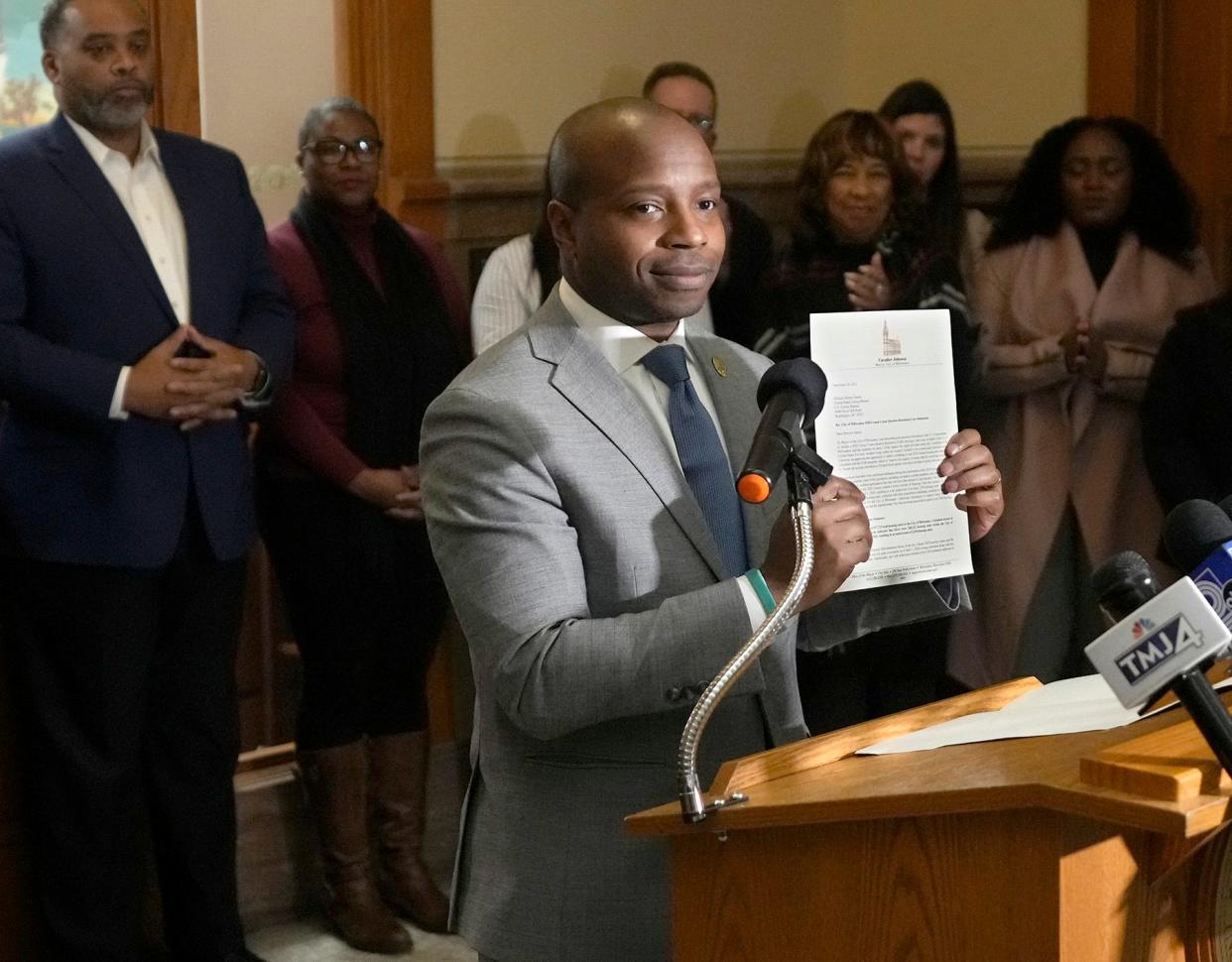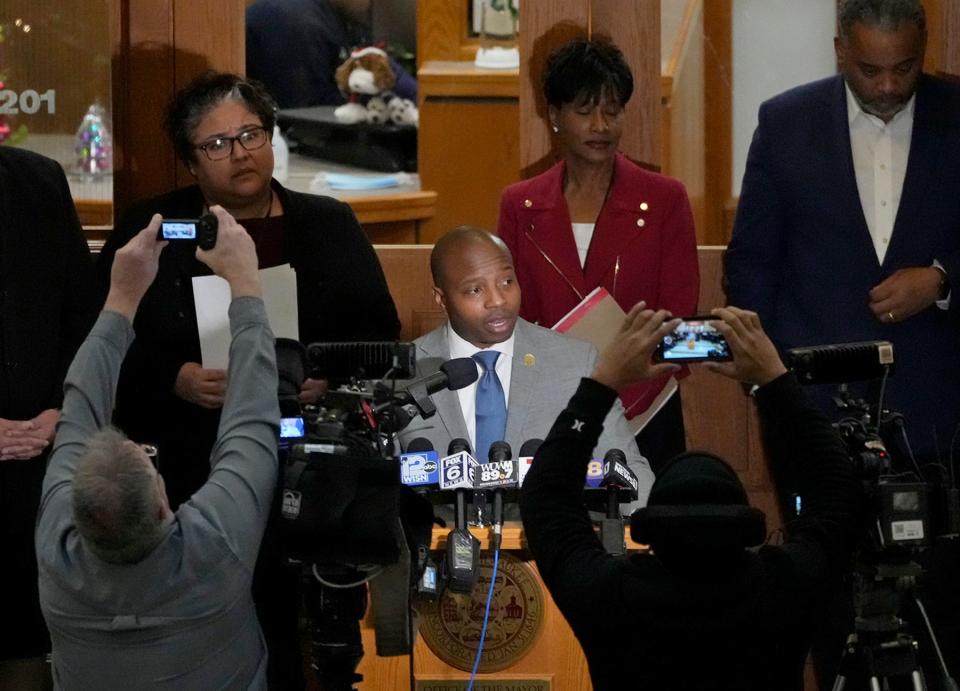Milwaukee Mayor Johnson files challenge to 2020 U.S. Census tally, says the city was undercounted by thousands

Milwaukee officials long skeptical of the 2020 U.S. Census tally are formally challenging the finding that the city lost nearly 3% of its population in the last 10 years, leaving it at its lowest population since 1930.
They argue that the once-a-decade survey fell as much as 16,500 residents short of the true population figure. If accurate, that new finding would reflect a population essentially unchanged from the previous tally of 594,833 in 2010.
"Much has been made over the previous two years of the city of Milwaukee census population totals showing a declining population. By submitting this formal challenge with the United States Census Bureau, we are here to set the record straight," Mayor Cavalier Johnson said during a news conference Tuesday at City Hall.
In challenging the findings of the nationwide survey, Milwaukee joins other cities including Detroit and Boston.
The census data show how communities have changed ― but the findings of the survey also define how congressional, state legislative and local electoral district maps are redrawn and how federal funding is allocated for the next 10 years.
Those federal resources are particularly critical as the city faces increasingly difficult budgets, Johnson said. The funds are used to provide access to affordable housing and support nonprofit organizations in addition to funding Milwaukee Public Schools, he said.
"This undercount has real impacts on federal funding and our ability to access the resources our community needs and quite frankly deserves," he said.
The census results were released in August 2021 and found that Milwaukee's population had dropped to 577,222, reflecting an exodus of more than 17,000 people since 2010.
Then-Milwaukee Mayor Tom Barrett questioned the population drop, and Johnson has taken up that mantle.

The 2020 Census faced a series of challenges, including shifting deadlines, funding problems, and difficulty hiring the required number of census workers to collect the data. And while then-President Donald Trump failed to get a citizenship question on the questionnaire, there were concerns the effort still may have scared people away. The administration's decision to end the count early in light of the COVID-19 pandemic was also seen by some as a political maneuver.
And as for when a response could come from U.S. Census Bureau, that’s up in the air.
“The timetable is fluid,” said Jordan Primakow, the legislative fiscal manager for the City of Milwaukee. “The U.S. Census Bureau takes these cases on a first-come, first-served basis.”
Milwaukee population closer to 593,722, city argues
The census undercounted the total housing units by 2,394 and likely over-counted vacant units by about 4,055 for a total of about 15,800 people, Johnson wrote in a five-page letter to U.S. Census Bureau Director Robert Santos.
They also argue about 700 people held in the Milwaukee County Jail downtown were instead counted as being in custody at the Milwaukee County House of Correction in Franklin.
In all, they believe Milwaukee’s April 1, 2020, population was approximately 593,722.
And they say the undercount occurred primarily in communities of color, specifically in the Black and Hispanic populations, based on the Census Bureau's own post-count analysis.
The 2020 survey found significant increases in Milwaukee and Milwaukee County among residents who identify as Hispanic, Asian or two or more races, while white and Black communities saw considerable decreases.
"For cities such as Milwaukee, where a majority of residents are people of color, this coverage error has the potential for significant impacts on population counts, including exacerbating the impacts of the housing unit undercount," Johnson wrote to Santos.
U.S. Sen. Tammy Baldwin and U.S. Rep. Gwen Moore in a joint letter urged Santos to take immediate action to address the undercount of Hispanic and Black residents, which they called "deeply troubling."
"The City of Milwaukee is home to a large, diverse population of Wisconsinites," they wrote. "These Wisconsinites contribute to the vibrancy of Milwaukee and deserve to be reflected in an accurate Census. We urge the Bureau to take prompt action to ameliorate the housing undercount that fails to capture the actual population of the City of Milwaukee."
Redistricting battle continues
This challenge by the city also highlights the recent battle at the local level regarding redistricting.
Earlier this year, following a Common Council committee's decision to move forward with an aldermanic map that had been previously vetoed, Latino rights leaders called on city officials to stop re-approval of the map.
To date, Latinos and Hispanics represent 20.1% of the city's population and many have pushed for a much-desired third majority district, which advocates have argued would fairly represent the population's major growth over the last decade.
The city’s challenge may serve as another opportunity to push for better representation.
“This has huge implications with regards to redistricting,” said Darryl Morin, the head of Milwaukee-based advocacy group Forward Latino. "The previous (presidential) administration made remarks leading up to the Census that intimidated a lot of folks in the Hispanic community. We think that also led to folks not completing it that otherwise would have. So, we’re very supportive of the Mayor’s challenge.”
Our subscribers make this reporting possible. Please consider supporting local journalism by subscribing to the Journal Sentinel at jsonline.com/deal.
DOWNLOAD THE APP: Get the latest news, sports and more
This article originally appeared on Milwaukee Journal Sentinel: Milwaukee challenges 2020 U.S. Census population drop
